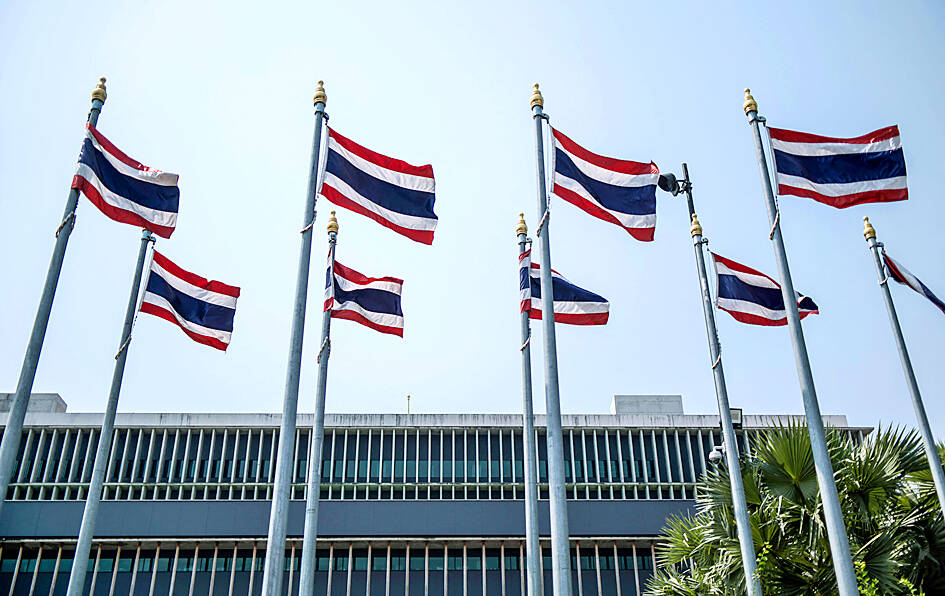Taiwan and Thailand have signed an agreement to promote and protect bilateral investment and trade, the Executive Yuan’s Office of Trade Negotiations (OTN) said on Friday.
The agreement on “Promotion and Protection of Investments” was signed by Representative to Thailand Chang Chun-fu (張俊福) and Thailand Trade and Economic Office in Taipei executive director Narong Boonsatheanwong on Thursday, the OTN said in a news release.
Thailand has become the fifth trading partner to sign an investment agreement with Taiwan since 2016, following earlier agreements with the Philippines, India, Vietnam and Canada, the OTN said.

Photo: AFP
The deal marks a significant milestone in the development of economic and trade relations between Taiwan and Thailand, it said.
The two sides previously signed an investment agreement in 1996, but as businesses have evolved and diversified that deal no longer met the needs of overseas investors, it said.
The new agreement was negotiated to provide more comprehensive protections and boost investor confidence, by ensuring that investment information remains transparent while a designated window is established to handle investment-related matters, the OTN said.
Information transparency means whenever there are new investment-related regulations or measures are amended, they must be announced immediately so businesses can more easily evaluate and formulate business plans, it added.
Meanwhile, the two sides would be required to establish a designated window to answer investment-related questions, allowing investors to quickly understand changes to the investment environment, it said.
Based on trade and investment statistics, since the implementation of the government’s New Southbound Policy in 2016, bilateral trade between Taiwan and Thailand has increased 74.6 percent from US$9.3 billion to US$16.24 billion, it said.
During this period, bilateral investment has also risen by 119.8 percent from US$3.18 billion to US$6.99 billion, reflecting Thailand’s status as one of Taiwan’s main trading and investment partners in ASEAN.
Exports of Taiwanese products to Thailand mainly include electrical components as well as machinery and other related parts, and it is also the Southeast Asian country’s largest supplier of integrated circuits.
In other news, Taiwan and Somaliland officials discussed energy and mineral exchanges as well as potential cooperation during Somaliland Minister of Energy and Minerals Abdilahi Farah Abdi’s visit on Thursday, the Ministry of Foreign Affairs (MOFA) said.
In a statement, MOFA said Abdi during a banquet on Thursday night highlighted Taiwan’s crucial role as an international development partner for Somaliland, and the African country’s abundant energy and mineral resources.
He expressed hope that the Taiwan-Somaliland energy and minerals meeting would boost Taiwanese business recognition of the African country’s investment potential, fostering long-term and mutually beneficial relations, MOFA said.
Vice Minister of Foreign Affairs Remus Chen (陳立國) said the two nations signed an energy and minerals cooperation agreement in 2022, followed by an inaugural joint working group meeting on energy and minerals in Somaliland last year.
Abdi’s visit to Taiwan aims to deepen cooperation in exploring and developing oil, gas and strategic minerals, Chen said.
The two countries are committed to freedom and democracy, he said.
Taiwan and Somaliland have closely cooperated since establishing representative offices in 2020, Chen added.

POSITIVE DEVELOPMENT: Japan and the US are expected to hold in-depth discussions on Taiwan-related issues during the meeting next month, Japanese sources said The holding of a Japan-US leaders’ meeting ahead of US President Donald Trump’s visit to China is positive news for Taiwan, former Japan-Taiwan Exchange Association representative Hiroyasu Izumi said yesterday. After the Liberal Democratic Party’s landslide victory in Japan’s House of Representatives election, Japanese Prime Minister Sanae Takaichi is scheduled to visit the US next month, where she is to meet with Trump ahead of the US president’s planned visit to China from March 31 to April 2 for a meeting with Chinese President Xi Jinping (習近平). Japan and the US are expected to hold in-depth discussions on Taiwan-related issues during the

‘LIKE-MINDED PARTNER’: Tako van Popta said it would be inappropriate to delay signing the deal with Taiwan because of China, adding he would promote the issue Canadian senators have stressed Taiwan’s importance for international trade and expressed enthusiasm for ensuring the Taiwan-Canada trade cooperation framework agreement is implemented this year. Representative to Canada Harry Tseng (曾厚仁) in an interview with the Central News Agency (CNA) said he was increasingly uneasy about Ottawa’s delays in signing the agreement, especially as Ottawa has warmed toward Beijing. There are “no negotiations left. Not only [is it] initialed, we have three versions of the text ready: English, French and Mandarin,” Tseng said. “That tells you how close we are to the final signature.” Tseng said that he hoped Canadian Prime Minister Mark Carney

President William Lai (賴清德) yesterday bestowed one of Taiwan’s highest honors on Saint Vincent and the Grenadines (SVG) Ambassador Andrea Clare Bowman in recognition of her contributions to bilateral ties. “By conferring the Order of Brilliant Star with Grand Cordon on Ambassador Bowman today, I want to sincerely thank her, on behalf of the Taiwanese people, for her outstanding contribution to deepening diplomatic ties between Taiwan and SVG,” Lai said at a ceremony held at the Presidential Office in Taipei. He noted that Bowman became SVG’s first ambassador to Taiwan in 2019 and

A man walks past elementary school artworks at the Taipei Lantern Festival in Ximen District yesterday, the first day of the event. The festival is to run from 5pm to 10pm through March 15.